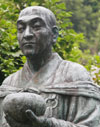 |
Ryokan (1758–1831) was a quiet and eccentric Zen Buddhist monk who lived much of his life as a hermit. He wrote poetry presenting the essence of Zen life, but refused any titles, such as teacher. His poems are characterised by his playfulness, directness and questioning nature. |
“Why do you so earnestly seek
the truth in distant places?
Look for delusion and truth in the
bottom of your own heart.”
– Ryokan
Taigu Ryokan (1758-1831) (nicknamed Great Fool) lives on as one of Japan’s best loved poets, the wise fool who wrote of his humble life with such directness. He is in a tradition of radical Zen poets or “great fools” including China’s P’ang Yun (Layman P’ang, 740-811) and Han-shan (Cold Mountain, T’ang Dynasty), and Japan’s poets of the Rinzai School: Ikkyu Sojun (Crazy Cloud, 1394-1481) and Hakuin Ekaku (1686-1769). Ryokan had no disciples, ran no temple, and in the eyes of the world was a penniless monk who spent his life in the snow country of Mt. Kugami. He admired most the Soto Zen teachings of Dogen Zenji and the unconventional life and poetry of Zen mountain poet Han-shan. He repeatedly refused to be honored or confined as a “professional” either as a Buddhist priest or a poet.
Who says my poems are poems?
These poems are not poems.
When you can understand this,
then we can begin to speak of poetry.
Ryokan never published a collection of verse while alive. His practice consisted of sitting in zazen meditation, walking in the woods, playing with children, making his daily begging rounds, reading and writing poetry, doing calligraphy, and on occasion drinking wine with friends. The poem below describes his stated approach to life.
“Too lazy to be ambitious,
I let the world take care of itself.
Ten days’ worth of rice in my bag;
a bundle of twigs by the fireplace.
Why chatter about delusion and enlightenment?
Listening to the night rain on my roof,
I sit comfortably, with both legs stretched out.”
– Ryokan
Ryokan Poems
